Genel Veri Koruma Tüzüğü'nün kısaltması olan GDPR, web sitelerini kullanırken kullanıcıların gizliliğini koruyan bir Avrupa Birliği yasasıdır.
Kullanıcılardan GDPR'yi basit İngilizceyle açıklamamızı ve WordPress sitenizi GDPR uyumlu hale getirme konusunda ipuçları paylaşmamızı isteyen düzinelerce e-posta aldık.
Bu makalede, GDPR ve WordPress hakkında bilmeniz gereken her şeyi (karmaşık yasal şeyler olmadan) açıklayacağız.
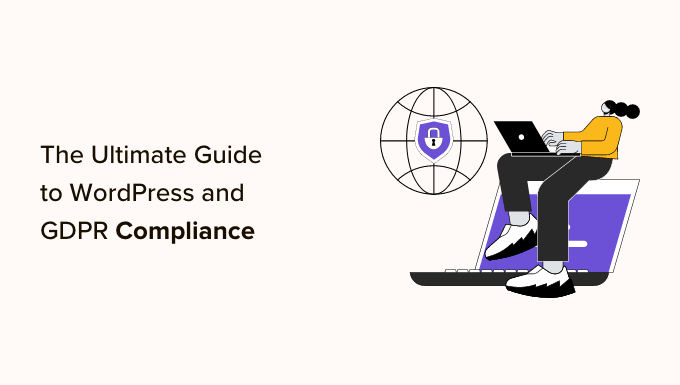
Sorumluluk Reddi
Biz avukat değiliz ve bu web sitesindeki hiçbir şey hukuki tavsiye olarak kabul edilmemelidir.
WordPress ve GDPR uyumluluğu konusundaki nihai kılavuzumuzda kolayca gezinmenize yardımcı olmak için aşağıda bir içindekiler tablosu oluşturduk:
- GDPR Nedir?
- GDPR WordPress Web Sitem İçin Geçerli mi?
- Web Sitesi Sahiplerinden GDPR Kapsamında Neler Talep Ediliyor?
- WordPress GDPR Uyumlu mu?
- GDPR Uyumluluğu İçin Web Sitenizdeki Ek Alanlar
- GDPR Uyumluluğu İçin En İyi WordPress Eklentileri
- Son Düşünceler
- WordPress Sitenizi GDPR Uyumlu Hale Getirme Uzman Rehberleri
- Ek Kaynaklar
GDPR Nedir?
Genel Veri Koruma Tüzüğü (GDPR), 25 Mayıs 2018'de yürürlüğe giren bir Avrupa Birliği (AB) yasasıdır. GDPR'nin amacı, AB vatandaşlarına kişisel verileri üzerinde kontrol sağlamak ve dünya genelindeki kuruluşların veri gizliliği yaklaşımını değiştirmektir.
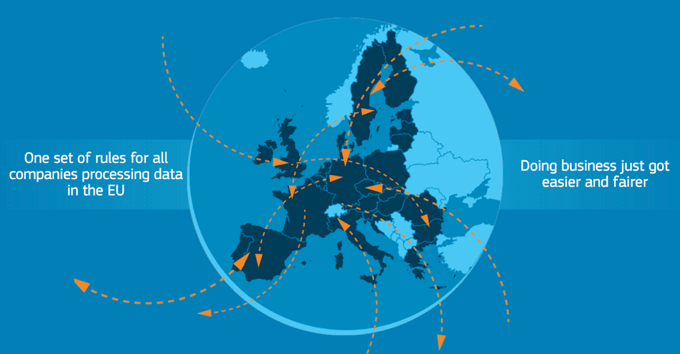
Yıllar içinde, Google gibi şirketlerden GDPR, yeni gizlilik politikaları ve diğer birçok yasal konu hakkında onlarca e-posta almış olabilirsiniz. Bunun nedeni, AB'nin düzenlemelere uymayanlar için büyük cezalar getirmesidir.
GDPR gerekliliklerine uymayan işletmeler, şirketin yıllık küresel gelirinin %4'üne veya 20 milyon €'ya (hangisi daha yüksekse) kadar büyük para cezalarıyla karşı karşıya kalabilir. Bu, dünya çapındaki işletmeler arasında yaygın bir paniğe neden olmak için yeterli bir nedendir.
CCPA Nedir?
Kaliforniya eyaleti, 1 Ocak 2020'de benzer bir gizlilik yasası çıkardı, ancak potansiyel para cezaları çok daha düşük.
California Tüketici Gizlilik Yasası (CCPA), Kaliforniya sakinlerinin kişisel bilgilerini korumak için tasarlanmıştır. Bu yasa, onlara kendileri hakkında hangi kişisel bilgilerin toplandığını bilme, silinmesini talep etme ve verilerinin satışını reddetme hakkı verir.
Bu makalede GDPR'ye odaklanacağız, ancak bu makalede listelediğimiz adımların çoğu CCPA uyumlu olmanıza da yardımcı olacaktır.
Bu, aklınızda olabilecek büyük soruya bizi getiriyor:
GDPR WordPress Web Sitem İçin Geçerli mi?
Cevap EVET. Avrupa Birliği ile sınırlı olmamak üzere, dünya çapındaki her büyüklükteki işletme için geçerlidir.
WordPress web sitenizde Avrupa Birliği ülkelerinden ziyaretçiler varsa, bu yasa sizin için geçerlidir.
Ama panik yapmayın. Dünyanın sonu değil.
GDPR bu yüksek seviyedeki para cezalarına kadar tırmanabilse de, bir uyarı, ardından bir kınama ve ardından veri işlemenin askıya alınmasıyla başlayacaktır.
Ve yalnızca yasayı ihlal etmeye devam ederseniz büyük para cezaları uygulanacaktır.
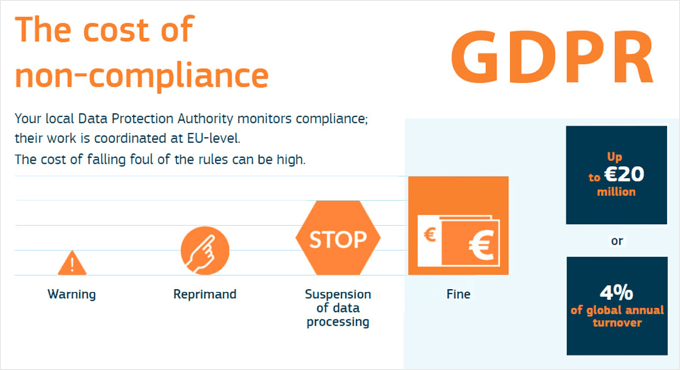
AB, size karşı kötü niyetli bir hükümet değildir. Amacı, masum tüketicileri gizliliklerinin ihlaline yol açabilecek pervasız veri işleme eylemlerinden korumaktır.
Kanımızca, azami para cezası büyük ölçüde Facebook ve Google gibi büyük şirketlerin dikkatini çekmek için tasarlanmıştır, böylece bu düzenleme GÖZ ARDI EDİLMEZ. Dahası, bu şirketleri insanların haklarını korumaya daha fazla önem vermeye teşvik eder.
GDPR'nin gerektirdiklerini ve yasanın ruhunu anladığınızda, bunların hiçbirinin çok çılgınca olmadığını anlayacaksınız.
WordPress sitenizi GDPR uyumlu hale getirmek için araçlar ve ipuçları da paylaşacağız.
Web Sitesi Sahiplerinden GDPR Kapsamında Neler Talep Ediliyor?
GDPR'nin amacı, kullanıcıların kişisel olarak tanımlanabilir bilgilerini (PII) korumak ve işletmeleri bu verileri nasıl topladıkları, sakladıkları ve kullandıkları konusunda daha yüksek bir standarda tabi tutmaktır.
Bu kişisel veriler, kullanıcılarınızın adlarını, e-posta adreslerini, fiziksel adreslerini, IP adreslerini, sağlık bilgilerini, gelirlerini ve daha fazlasını içerir.
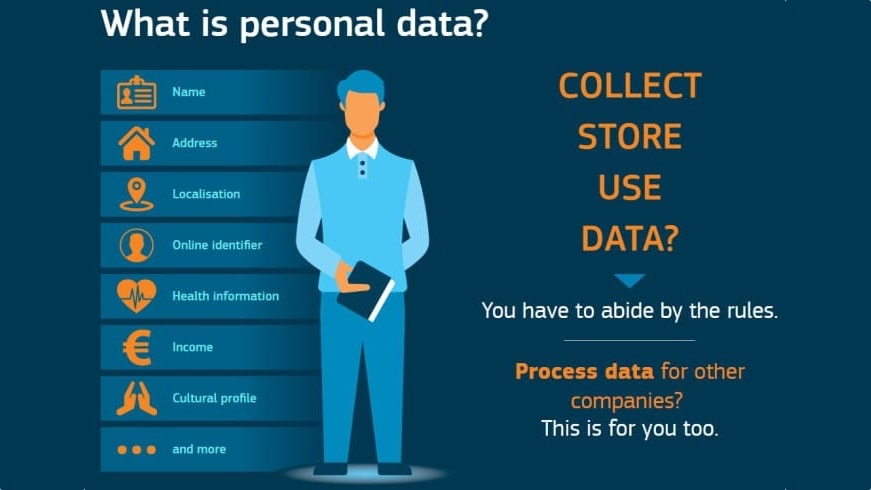
GDPR düzenlemesi 200 sayfa uzunluğunda olsa da, bilmeniz gereken en önemli sütunlar şunlardır:
Kişisel Bilgi Toplamak İçin Açık Rıza Almalısınız
Bir AB sakininin kişisel verilerini topluyorsanız, açık, belirli ve belirsiz rıza veya izin almanız gerekir.
Başka bir deyişle, size kartvizitini veren veya web sitenizin iletişim formunu dolduran birine izinsiz e-posta gönderemezsiniz. Bu spam'dir. Bunun yerine, pazarlama bülteninize kaydolmalarına izin vermelisiniz.
Açık rıza olarak kabul edilmesi için, olumlu bir onay gerektirmeniz gerekir. Onay kutusu varsayılan olarak işaretlenmemeli, açık bir ifade içermeli (yasal dil olmamalı) ve diğer şartlar ve koşullardan ayrı olmalıdır.
Kullanıcılarınız Kişisel Verilerine Hak Sahiptir
Bireylere verilerinin nerede, neden ve nasıl işlendiği ve saklandığı konusunda bilgi vermelisiniz.
Bir bireyin kişisel verilerini indirme hakkı ve unutulma hakkı vardır.
Bu, kişisel verilerini silmelerini talep etme hakları olduğu anlamına gelir. Bir kullanıcı abonelikten çıkma bağlantısını tıkladığında veya sizden profilini silmenizi istediğinde, bunu gerçekten yapmanız gerekir.
Veri İhlali Bildirimlerini Hızla Sağlamalısınız
Kuruluşlar, ihlalin zararsız olduğu ve bireysel verilere risk oluşturmadığı kabul edilmediği sürece, belirli türdeki veri ihlallerini 72 saat içinde ilgili makamlara bildirmelidir.
Ancak, bir ihlal yüksek riskliyse, şirket etkilenen kişileri de derhal bilgilendirmelidir.
Bu, umarım Yahoo'nun satın alma işlemine kadar açıklanmayan örtbas etmelerini önleyecektir.
Bir Veri Koruma Görevlisi Atamanız Gerekebilir
Eğer halka açık bir şirketseniz veya büyük miktarda kişisel bilgiyi işliyorsanız, bir veri koruma görevlisi atamanız gerekir.
Küçük işletmeler için bu zorunlu değildir. Şüpheniz varsa bir avukata danışın.
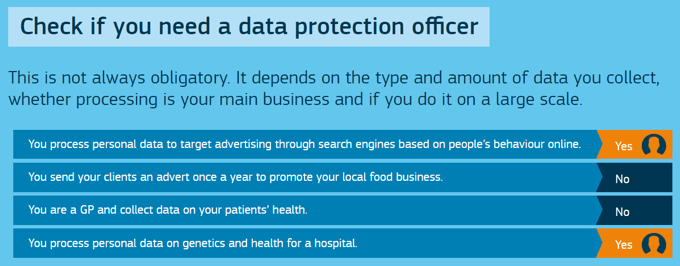
Nelerin Gerekli Olduğunun Sade İngilizce Özeti
Sade İngilizce ifade etmek gerekirse, GDPR, işletmelerin istemedikleri e-postalar göndererek insanları spamleyememelerini sağlar. İşletmeler ayrıca açık izinleri olmadan insanların verilerini satamazlar.
İşletmeler, istendiğinde kullanıcı hesaplarını silmek ve onları e-posta listelerinden çıkarmak zorundadır. İşletmeler ayrıca veri ihlallerini bildirmek ve genel olarak veri koruma konusunda daha iyi olmak zorundadır.
En azından teoride kulağa oldukça iyi geliyor.
Ancak muhtemelen WordPress sitenizin GDPR uyumlu olduğundan emin olmak için ne yapmanız gerektiğini merak ediyorsunuzdur.
Bu, özel web sitenize bağlıdır (daha sonra bu konuda daha fazla bilgi).
Kullanıcılardan aldığımız en büyük soruyu yanıtlayarak başlayalım:
WordPress GDPR Uyumlu mu?
Evet, WordPress çekirdek yazılımı, 17 Mayıs 2018'de yayınlanan WordPress 4.9.6'dan beri GDPR uyumludur. Bunu başarmak için birkaç GDPR geliştirmesi eklendi.
WordPress'ten bahsettiğimizde, kendi kendine barındırılan WordPress.org'dan bahsettiğimizi belirtmek önemlidir. Bu, WordPress.com'dan farklıdır ve farkı WordPress.com vs. WordPress.org hakkındaki rehberimizde öğrenebilirsiniz.
Bununla birlikte, web sitelerinin dinamik doğası gereği, tek bir platform, eklenti veya çözüm %100 GDPR uyumluluğu sunamaz. GDPR uyumluluk süreci, sahip olduğunuz web sitesinin türüne, hangi verileri sakladığınıza ve sitenizde verileri nasıl işlediğinize bağlı olarak değişecektir.
Tamam, yani bunun basit İngilizce'de ne anlama geldiğini düşünüyor olabilirsiniz.
Varsayılan olarak WordPress aşağıdaki GDPR geliştirme araçlarıyla birlikte gelir:
Yorum Onay Kutucuğu
Mayıs 2018'den önce WordPress, varsayılan olarak yorumcunun adını, e-postasını ve web sitesini kullanıcının tarayıcısında bir çerez olarak saklardı. Bu, alanlar önceden doldurulduğu için kullanıcıların favori bloglarına yorum bırakmalarını kolaylaştırdı.
GDPR'nin onay gereksinimi nedeniyle WordPress, yorum formuna bir onay kutusu ekledi.

Kullanıcı bu kutuyu işaretlemeden yorum bırakabilir. Ancak, bunu her yaptıklarında adlarını, e-postalarını ve web sitelerini manuel olarak girmeleri gerekecektir.
İpucu: Onay kutusunun orada olup olmadığını görmek için test ederken oturumunuzun kapalı olduğundan emin olun.
Onay kutusu hala görünmüyorsa, temanız büyük olasılıkla varsayılan WordPress yorum formunu geçersiz kılıyor. İşte WordPress temanıza bir GDPR yorum gizlilik onay kutusu ekleme konusunda adım adım bir kılavuz.
Kişisel Veri Dışa Aktarma ve Silme Özellikleri
WordPress, site sahiplerine GDPR'nin veri işleme gerekliliklerine uymaları ve kullanıcıların kişisel verilerini dışa aktarma ve kullanıcıların kişisel verilerini silme taleplerini yerine getirmeleri için gereken araçları sunar.
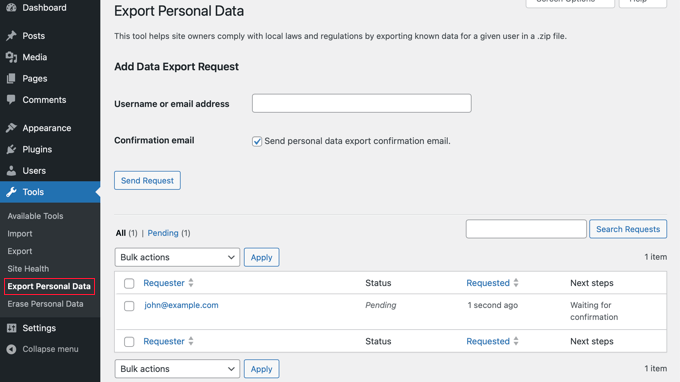
Veri işleme özellikleri, WordPress yönetici panelindeki Araçlar menüsü altında bulunabilir. Buradan Kişisel Verileri Dışa Aktar veya Kişisel Verileri Sil seçeneklerine gidebilirsiniz.
Gizlilik Politikası Oluşturucu
WordPress, yerleşik bir gizlilik politikası oluşturucu ile birlikte gelir. Önceden hazırlanmış bir gizlilik politikası şablonuna sahiptir ve ne eklemeniz gerektiği konusunda size rehberlik eder. Bu, hangi verileri sakladığınız ve verilerinizi nasıl işlediğiniz konusunda kullanıcılarla daha şeffaf olmanıza yardımcı olur.
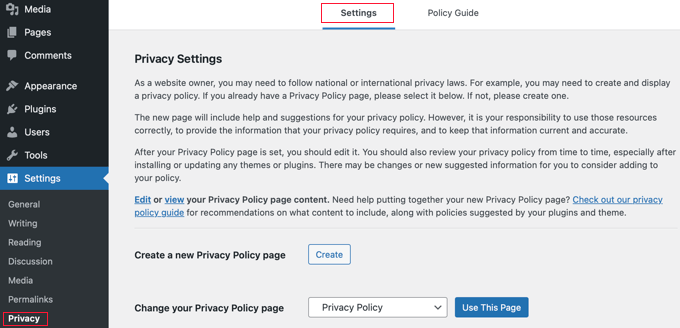
WordPress'te gizlilik politikası oluşturma hakkındaki rehberimizde daha fazla bilgi edinebilirsiniz.
Bu üç özellik, varsayılan bir WordPress blogunu GDPR uyumlu hale getirmek için yeterlidir. Ancak, web sitenizin uyumlu olması gereken ek alanları da olacaktır.
GDPR Uyumluluğu İçin Web Sitenizdeki Ek Alanlar
Bir web sitesi sahibi olarak, veri depolayan veya işleyen çeşitli WordPress eklentileri kullanıyor olabilirsiniz ve bunlar GDPR uyumluluğunuzu etkileyebilir. Yaygın örnekler şunlardır:
- İletişim formları
- Analitik
- E-posta pazarlaması
- Çevrimiçi mağazalar
- Üyelik siteleri
- Ve daha fazlası
Web sitenizde kullandığınız WordPress eklentilerine bağlı olarak, web sitenizin GDPR uyumlu olduğundan emin olmak için buna göre hareket etmeniz gerekecektir.
En iyi WordPress eklentilerinin çoğu GDPR iyileştirme özellikleri ekledi. Ele almanız gereken bazı yaygın alanlara göz atalım.
Google Analytics
Çoğu web sitesi sahibi gibi, web sitesi istatistiklerini almak için büyük olasılıkla Google Analytics kullanıyorsunuz. Bu, IP adresleri, kullanıcı kimlikleri, çerezler ve davranış profilleme için diğer veriler gibi kişisel verileri topluyor veya izliyor olabileceğiniz anlamına gelir.
GDPR uyumlu olmak için aşağıdakilerden birini yapmanız gerekir:
- Verileri anonimleştirin, depolama ve işlemeye başlamadan önce.
- Çerezler hakkında bildirimde bulunan ve izlemeden önce kullanıcılardan izin isteyen bir katman ekleyin.
Sitenize yalnızca Google Analytics kodunu manuel olarak yapıştırıyorsanız, bunların her ikisi de oldukça zordur. Ancak, WordPress için en popüler Google Analytics eklentisi olan MonsterInsights kullanıyorsanız, şanslısınız.
Yukarıdaki süreci otomatikleştirmeye yardımcı olan bir AB uyumluluk eklentisi yayınladılar.

MonsterInsights ayrıca GDPR ve Google Analytics hakkında konuşan çok iyi bir blog yazısına sahiptir. Sitenizde Google Analytics kullanıyorsanız bu mutlaka okunmalıdır.
İletişim Formları
Eğer WordPress'te bir iletişim formu kullanıyorsanız, ek şeffaflık önlemleri eklemeniz gerekebilir. Bu, özellikle form girişlerini saklıyorsanız veya verileri pazarlama amaçlı kullanıyorsanız geçerlidir.
WordPress formlarınızı GDPR uyumlu hale getirirken göz önünde bulundurmanız gereken bazı şeyler şunlardır:
- Kullanıcıların bilgilerini saklamak için açık onaylarını alın.
- Verilerini pazarlama amacıyla, örneğin e-posta listenize eklemek gibi kullanmayı planlıyorsanız, kullanıcılardan açık onay alın.
- Çerezleri, kullanıcı aracısını ve IP takibini formlar için devre dışı bırakın.
- Veri silme taleplerine uyun.
- Bir SaaS form çözümü kullanıyorsanız, form sağlayıcılarınızla bir veri işleme sözleşmeniz olduğundan emin olun.
İyi haber şu ki, WPForms, Gravity Forms veya Ninja Forms gibi bir WordPress eklentisi kullanıyorsanız, bir veri işleme sözleşmesi düzenlemenize gerek yoktur.
Bu eklentiler form girişlerinizi WordPress veritabanınızda saklar, bu nedenle GDPR uyumlu kalmak için net bir açıklama ile bir onay kutusu eklemeniz yeterlidir.
WPBeginner'da kullandığımız iletişim formu eklentisi WPForms, tek bir tıklamayla GDPR onay alanı eklemenizi, kullanıcı çerezlerini devre dışı bırakmanızı, kullanıcı IP toplama özelliğini devre dışı bırakmanızı ve girişleri devre dışı bırakmanızı kolaylaştıran birkaç GDPR geliştirmesine sahiptir.
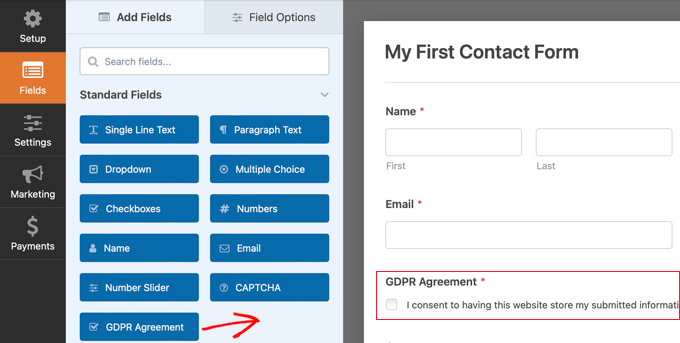
WordPress'te GDPR uyumlu formların nasıl oluşturulacağına dair adım adım kılavuzumuzu görebilirsiniz.
E-posta Pazarlama İzin Formları
İletişim formlarına benzer şekilde, açılır pencereler, kayan çubuklar, satır içi formlar ve diğerleri gibi e-posta pazarlaması için kayıt formlarınız varsa, listeye eklemeden önce kullanıcılardan açık rıza aldığınızdan emin olmanız gerekir.
Bunu şunlardan biriyle yapabilirsiniz:
- Kaydolmadan önce kullanıcının tıklaması gereken bir onay kutusu ekleyin.
- E-posta listenize basitçe çift onay isteyin.
OptinMonster gibi önde gelen potansiyel müşteri oluşturma çözümleri, e-posta izin formlarınızı uyumlu hale getirmenize yardımcı olmak için GDPR onay kutuları ve diğer gerekli özellikleri ekledi.
OptinMonster blogunda pazarlamacılar için GDPR stratejileri hakkında daha fazla bilgi edinebilirsiniz.
E-ticaret ve WooCommerce Mağazaları
WordPress'in en popüler e-ticaret eklentisi olan WooCommerce kullanıyorsanız, web sitenizin GDPR'ye uyumlu olduğundan emin olmanız gerekir.
Neyse ki, MonsterInsights ekibi bir WooCommerce mağazasının nasıl GDPR uyumlu hale getirileceği konusunda ayrıntılı bir kılavuz hazırladı.
Yeniden Hedefleme Reklamları
Web siteniz yeniden hedefleme pikselleri veya yeniden hedefleme reklamları çalıştırıyorsa, kullanıcının iznini almanız gerekecektir.
Bunu, WPConsent gibi bir eklenti kullanarak yapabilirsiniz. Temel çerez bildirimlerinin aksine, yalnızca bir uyarı gösteren bu eklenti, kullanıcılar izin verene kadar tüm izleme betiklerini engeller.

Eklenti, ayrıntılı izin kayıtlarını tutarken Google Analytics ve Facebook Pikseli gibi popüler hizmetleri yönetir, böylece pazarlama kampanyalarınızı tam uyumlu olduğunuzu bilerek yürütebilirsiniz.
GDPR/CCPA için WordPress'te çerez bildirim çubuğu ekleme konusunda ayrıntılı talimatları rehberimizde bulabilirsiniz.
Google Yazı Tipleri
Google Yazı Tipleri, WordPress web sitenizdeki tipografiyi özelleştirmek için harika bir yoldur.
Ancak, Google Fonts'un GDPR düzenlemelerini ihlal ettiği bulunmuştur. Bunun nedeni, Google'ın bir yazı tipi yüklendiğinde ziyaretçinizin IP adresini kaydetmesidir.
Neyse ki, web sitenizin GDPR uyumlu olması için bunu ele almanın birkaç yolu vardır. Örneğin, yazı tiplerinizi yerel olarak yükleyebilir, Google Yazı Tiplerini başka bir seçenekle değiştirebilir veya devre dışı bırakabilirsiniz.
Bunu nasıl yapacağınızı, Google yazı tiplerini gizlilik dostu hale getirme hakkındaki rehberimizde öğrenebilirsiniz.
GDPR Uyumluluğu İçin En İyi WordPress Eklentileri
GDPR uyumluluğunun bazı bölümlerini otomatikleştirmeye yardımcı olabilecek birkaç WordPress eklentisi vardır.
Ancak, web sitelerinin dinamik doğası nedeniyle hiçbir eklenti %100 uyumluluk sunamaz.
%100 GDPR uyumluluğu sunduğunu iddia eden herhangi bir WordPress eklentisine dikkat edin. Muhtemelen ne konuştuklarını bilmiyorlar ve onlardan tamamen kaçınmanız sizin için en iyisidir.
GDPR uyumluluğu için önerdiğimiz eklentilerin listesi aşağıdadır:
- WPConsent, ziyaretçiler izin verene kadar tüm izleme komut dosyalarını otomatik olarak engeller, kullanıcı onayının ayrıntılı kayıtlarını tutar ve sitenizi uyumlu tutmak için kolayca özelleştirilebilen gizlilik bannerları içerir. Ayrıca WPConsent'in ücretsiz bir sürümü de mevcuttur.
- Google Analytics kullanıyorsanız, MonsterInsights kullanmanızı ve AB uyumluluk eklentilerini etkinleştirmenizi öneririz.
- WPForms, en kullanıcı dostu WordPress iletişim formu eklentisidir ve GDPR alanları, eski girdiler için bir otomatik silme özelliği ve diğer gizlilik araçları sunar.
- Çerez Bildirimi, bir AB çerez bildirimi eklemek için popüler ücretsiz bir eklentidir ve MonsterInsights gibi üst eklentilerle ve diğerleriyle iyi entegre olur.
- GDPR Cookie Consent sitenizde bir uyarı çubuğu oluşturmanıza olanak tanır, böylece kullanıcı çerezleri kabul edip etmeyeceğine veya reddedeceğine karar verebilir ve CCPA'nın yanı sıra GDPR'yi de kapsar.
- WP Frontend Delete Account, kullanıcıların sitenizdeki profillerini otomatik olarak silmelerini sağlayan ücretsiz bir eklentidir.
- OptinMonster, dönüşümleri artırmak için akıllı hedefleme özellikleri sunan ve GDPR uyumlu olan gelişmiş bir potansiyel müşteri oluşturma yazılımıdır.
- PushEngage ziyaretçilerin sitenizden ayrıldıktan sonra onlara hedeflenmiş anlık bildirim mesajları göndermenizi sağlar ve tamamen GDPR uyumludur.
- Smash Balloon, canlı akışları yerleştirmek ve Facebook, Twitter, Instagram, YouTube, TripAdvisor ve daha fazlasından gönderileri göstermek için GDPR uyumlu bir yol sunar.
- Novashare, kullanıcıların kişisel verilerini toplamadan veya çerez yerleştirmeden içeriğinizi sosyal medyada paylaşmalarına olanak tanır.
Uyumluluğu artırmak için en iyi WordPress GDPR eklentileri hakkındaki uzman seçimimizde daha fazla seçenek bulacaksınız.
Herhangi bir başka WordPress eklentisinin öne çıkıp önemli GDPR uyumluluk özellikleri sunup sunmadığını görmek için eklenti ekosistemini izlemeye devam edeceğiz.
Son Düşünceler
GDPR Mayıs 2018'den beri yürürlüktedir.
Belki de WordPress web siteniz bir süredir var ve GDPR uyumluluğu için çalışıyorsunuzdur. Ya da yeni bir web sitesiyle yeni başlıyor olabilirsiniz.
Her iki durumda da panik yapmaya gerek yok. Sadece uyumluluk için çalışmaya devam edin ve en kısa sürede halledin.
Büyük para cezaları konusunda endişeli olabilirsiniz. Para cezası alma riskinin minimal olduğunu unutmayın. Avrupa Birliği'nin web sitesi, önce bir uyarı, ardından bir kınama alacağınızı ve uyumlulukta başarısız olursanız ve yasayı bilerek görmezden gelirseniz para cezalarının son adım olduğunu belirtiyor.
AB'nin size karşı olmadığını unutmayın. Kullanıcı verilerini korumak ve insanların çevrimiçi işletmelere olan güvenini yeniden tesis etmek için bunu yapıyorlar.
Dünya dijitalleştikçe bu standartlara ihtiyacımız var. Büyük şirketlerin son veri ihlalleriyle birlikte, bu standartların küresel olarak uyarlanması önemlidir.
Bu, ilgili herkes için iyi olacaktır. Bu yeni kurallar tüketici güvenini artırmaya yardımcı olacak ve dolayısıyla işletmenizin büyümesine katkıda bulunacaktır.
Bu öğreticinin WordPress blogunuzda nasıl GDPR uyumlu olacağınızı öğrenmenize yardımcı olduğunu umuyoruz. Ayrıca web sitenizi nasıl GDPR uyumlu hale getireceğinize dair uzman rehberlerimize de göz atmak isteyebilirsiniz.
WordPress Sitenizi GDPR Uyumlu Hale Getirme Uzman Rehberleri
- WordPress'e GDPR Yorum Gizliliği Onay Kutusu Nasıl Eklenir
- GDPR/CCPA için WordPress'e Çerez Açılır Penceresi Nasıl Eklenir
- WordPress Siteniz Çerez Kullanıp Kullanmadığını Nasıl Anlarsınız
- WordPress'te GDPR Uyumlu Formlar Oluşturma
- Google Analytics'ten Kişisel Olarak Tanımlanabilir Bilgileri Nasıl Uzak Tutulur
- Google Fontlarını Gizlilik Dostu Yapma
- WordPress Sitenizde Google Fontlarını Devre Dışı Bırakma
- WordPress'e Gizlilik Politikası Nasıl Eklenir
- WordPress'te Bilgilerimi Satma Sayfası Oluşturma
Bu makaleyi beğendiyseniz, lütfen WordPress video eğitimleri için YouTube Kanalımıza abone olun. Bizi ayrıca Twitter ve Facebook'ta da bulabilirsiniz.
Yasal Uyarı
Biz avukat değiliz ve bu web sitesindeki hiçbir şey yasal tavsiye olarak kabul edilmemelidir. Web sitelerinin dinamik doğası gereği, tek bir eklenti veya platform %100 yasal uyumluluk sunamaz.
Şüpheye düştüğünüzde, yetkili olduğunuz yargı bölgeleri ve kullanım senaryolarınız için geçerli tüm yasalara uyup uymadığınızı belirlemek üzere uzman bir internet hukuku avukatına danışmanız en iyisidir.
Ek Kaynaklar
- GDPR Histerisi Bölüm I ve Bölüm II Jacques Mattheij tarafından
- Avrupa Komisyonu tarafından hazırlanan Veri Koruma Bilgilendirmesi
- Avrupa Komisyonu'nun GDPR İlkeleri
- GDPR ve MonsterInsights – Google Analytics GDPR uyumluluğu hakkında bilmeniz gereken her şey
- WPForms için GDPR İyileştirme Özellikleri – WordPress formlarınız için GDPR uyumluluğu hakkında bilmeniz gereken her şey
- WooCommerce ve GDPR – çevrimiçi mağazanız için GDPR uyumluluğu hakkında bilmeniz gereken her şey
- OptinMonster ve GDPR – GDPR uyumluluğu ve e-posta pazarlaması için izin formları hakkında bilmeniz gereken her şey
Bu makaleyi beğendiyseniz, lütfen WordPress video eğitimleri için YouTube Kanalımıza abone olun. Bizi ayrıca Twitter ve Facebook'ta da bulabilirsiniz.





Olaf
GDPR gerçekten karmaşık bir konudur, bazen o kadar karmaşıktır ki kurumsal web siteleri için profesyonel veya avukat tutmak daha iyidir. Böyle karmaşık ve kapsamlı bir konuya değinmeniz harika. GDPR uyumlu bir web sitesi oluşturmak için bilgi edinmek üzere birkaç kurs almış olsam da, öğrenmekten mutluluk duyduğum her zaman yeni bilgiler vardır.
Chris
Yönetici'deki araçlar sekmesinin altındaki sekmelere şimdiye kadar hiç dikkat etmemiştim. WordPress'in sağladığı gizlilik politikası sayfası, gelecekte çalıştırabileceğim herhangi bir web sitesi için yeterli görünüyor. GDPR yalnızca AB'de bulunan web siteleri için mi geçerlidir, yoksa AB'den ziyaretçileri olan web siteleri için de geçerli midir?
WPBeginner Desteği
AB'den ziyaretçileriniz varsa sitenizi etkilerdi
Yönetici
Jiří Vaněk
GDPR, Avrupa Birliği ülkelerindeki vatandaşlar ve daimi ikamet eden tüm kullanıcılara uygulanır. Bu, bu tür kullanıcıların sitenizi ziyaret etme olasılığı varsa, GDPR uyumlu olması ve aynı güvenceleri sağlaması gerektiği anlamına gelir. Örneğin, web sitenizde kullanıcıların çerezleri reddetmesine izin veren bir çerez onay banner'ı olmalı ve e-posta adresi toplama, diğer önlemlerin yanı sıra çift onay doğrulama kullanmalıdır.
AB üyesi olmayan bir ülkenin vatandaşıysanız yasal yaptırımın gerçekleşip gerçekleşmeyeceği sorgulanabilir ve muhtemelen karmaşıktır. Kişisel olarak, öncelikli olarak AB vatandaşlarını hedefleyen siteler için uyumluluğu sağlamaya odaklanırdım. ABD'de yaşayan birinin kişisel blogu için, kullanıcıların bu tür siteleri ziyaret etme seçimi olduğundan GDPR o kadar kritik olmayabilir. Ancak, ilginç ama karmaşık bir konu. Yine de, GDPR kurallarına uymakta zarar yoktur.
Mrteesurez
Ayrıca, belki de bu yüzden WordPress'in kendisi bazı önerilen metinlerle birlikte temel bir gizlilik politikası oluşturucu ile geliyor, diye görebiliyorum.
Çok uzun zaman önce keşfetmedim.
Ancak bu temel içerik yeterli mi ?? çünkü bazen yeni bloglar için temel WP tarafından oluşturulan politika içeriklerini kullanıyorum.
WPBeginner Desteği
Gizlilik politikasındaki içeriği ihtiyaçlarınıza göre düzenlemek isteyebilirsiniz ve endişeliyseniz bir hukuk profesyoneline danışmak isteyebilirsiniz.
Yönetici
Mrteesurez
Tamam, belki blog büyüyüp daha fazla ilgi çektiğinde, o zaman standart ve resmi bir politika için bir hukuk profesyoneline başvurabilirim.
Teşekkürler.
Mrteesurez
Dürüst olmak gerekirse, çevrimiçi para kazanmak isteyen blog yazarlarının ve çevrimiçi pazarlamacıların çoğu bunu genellikle ciddiye almaz.
Google'ın ve izleme yazılımı kullanan diğer bazı işletmelerin basında ne kadar para cezası ödediğini duyduğumu hatırlayabiliyorum.
Sorunum şu ki, bu yalnızca AB'den ziyaretçim varsa mı geçerli ??
Ayrıca, ‘onay kutusu’ndan bahsediyorsunuz.
WPbeginner'da onay kutusu görünmüyor, yorum yapmak istediğim her seferde adları ve e-postayı manuel olarak yeniden girmem gerekiyor. Bunu düzeltebilir misiniz?? Yoksa bunu yapmamak için bir sebep var mı??
WPBeginner Desteği
AB'den daha fazlası için geçerlidir, yukarıdaki makalede Kaliforniya örneğini veriyoruz.
Şu anda onay kutumuz yok, tema stilimiz onay kutusunu geçersiz kılıyor. Şu an için bilgilerinizi tarayıcıda kaydetmiyoruz.
Yönetici
Mrteesurez
Tamam, anladım ama topluluğa kolay katılım için uygulamayı deneyebilirsiniz.
Otomatik olarak doldurulabilir veya tarayıcıda kaydedilebilir ancak bir feragatname verin veya gizlilik politikanıza dahil edin.
Jiří Vaněk
Daha önce bu konuya pek dikkat etmemiştim ama pratik, özellikle yasalara gelince, web sitesinde her şeyi yolunda bulundurmanın gerçekten çok daha iyi olduğunu gösterdi. Bir AB ülkesinde yaşadığım için GDPR artık benim için en önemli öncelik. Bunlar gibi rehberler harika çünkü her zaman gözden kaçırılabilecek bir şeyler vardır.
WPBeginner Desteği
Glad you found our guide helpful
Yönetici
Moinuddin Waheed
Neyse ki Avrupa ülkesinden değilim, bu da GDPR kuralının web sitem için geçerli olmayacağı anlamına geliyor. Ancak veri koruma, yalnızca Avrupa ülkeleri için değil, her ülke için önemli bir konu olmuştur. Kendi ülkemizde de benzer bir veri koruma tasarısı var. Çevrimiçi veri ve içerik açısından artan bir farkındalık görmek gerçekten iyi. GDPR'nin her ayrıntısını bizim için detaylandırdığınız için teşekkürler
WPBeginner Desteği
You’re welcome
Yönetici
Ralph
Sadece ne yapılması gerektiğini değil, aynı zamanda nasıl ve neden önemli olduğunu da açıklayan bu kadar ayrıntılı bir rehber bulmak harika.
GDPR'yi, kullanıcının verileri üzerinde bir miktar etkisi olabileceği için bir artı olarak görüyorum, ancak web sitelerinde giderek daha fazla sinir bozucu açılır pencereyle karşılaşmak zorundayız. Çerezler, reklamlar, bültenler, GDPR… 5 veya 10 yıl içinde bunların çoğunu kapatmakla web sitelerini okumak arasında daha fazla zaman harcayacağız. Hükümetlerin tüm bunların yerini alacak yeni bir fikir bulabilmesini dilerdim.
Geethu
Detaylı açıklama için teşekkürler. Özellikle GDPR'nin AB dışındaki web siteleri için geçerli olup olmadığı ve onları GDPR uyumlu hale getirirken nelere dikkat edilmesi gerektiği konusundaki bazı sorularımı netleştirdi.
WPBeginner Desteği
Rica ederim, bazı kafa karışıklıklarını giderebildiğimize sevindik!
Yönetici
Ram E.
İki çerez bildirim eklentisini (Cookie Notice ve GDPR Cookie Consent) listelediğiniz için teşekkürler! Birini bloguma bulup yüklemek istiyordum. Bu uyumluluk işleri, blogumu henüz kullanıcı kayıtlarına açmamamın nedenlerinden biri ve giderek daha fazla ülke bunu gerektirdiğinde daha da karmaşıklaşacak. Kişisel olarak, bir AB ülkesi veya Kaliforniya oturumlara göre ilk 10 konumunuz arasında değilse bunun büyük bir sorun olmadığını düşünüyorum.
WPBeginner Desteği
You’re welcome, glad our recommendations were helpful
Yönetici
John Fernandez
Makale için teşekkürler! Bu rehber WordPress sitemi daha iyi yönetmeme yardımcı olacak.
WPBeginner Desteği
Glad our guide was helpful
Yönetici
Ahmed Omar
Detaylı gönderiniz için teşekkürler.
GDPR ile ilgili bir endişem var, ziyaretçi şartları kabul etmezse sitemi gezebilir veya kayıt olabilir mi?
Teşekkürler
WPBeginner Desteği
Erişimini engellemek üzere ayarlamadığınız sürece, kullanıcılar sitenize göz atmaya devam edebilmelidir. Kayıt için kayıtları önlemek üzere zorunlu bir onay kutusu kullanabilirsiniz.
Yönetici
Mikolaj
Makale için teşekkürler! WP'nin durumun gelişimini sürekli olarak takip ettiğini bilmek güzel
Charles Anderson
Harika bir yazı, faydalı WordPress ve GDPR rehberi. Daha fazla makale yayınlamaya devam edin.
WPBeginner Desteği
Thank you, glad you liked our article
Yönetici
Chris H
İyi bir yazı türü. Tüm KOBİ'ler ve büyük işletmeler GDPR uyumlu olmalıdır. Personelin GDPR Farkındalığı sağlanmalıdır.
WPBeginner Desteği
Glad you liked our content
Yönetici
Shashank
Güzel Blog. GDPR hakkındaki makaleniz için teşekkürler. Benim için çok gerekliydi
Gavin
Hala bu konuda biraz kafam karışık. Bazıları, onay aldığınız ve kullanıcıları uyarmak ve onay vb. almak için çerez/gizlilik açılır penceresi gibi bir şey kullandığınız sürece sorun olmadığını söylüyor. Ancak kesinlikle biri sitenizi ziyaret ettiğinde, çerezler zaten tarayıcılarına yerleştirilmiş oluyor, bu durumda tüm çerezler vb. kullanıcılar kabul edene kadar kullanılmamalı mı? Durum buysa, bunu nasıl başarırız?
Konrad
Sayfanın yüklenmesi için bazı çerezler gereklidir.
Kullanıcılar 3. taraf ve zorunlu olmayan çerezlerin kullanımını kabul eder.
Trond
Merhaba,
GDPR eklentisi için Çerez Bildirimi'nin “%100 GDPR uyumlu” olduğunu belirttiğimi de eklemek isterim. Eklenti sayfasındaki “özellikler şunları içerir” bölümüne bakın.
“%100 GDPR uyumluluğu sunduğunu iddia eden herhangi bir WordPress eklentisine dikkat edin. Muhtemelen ne hakkında konuştuklarını bilmiyorlar ve onlardan tamamen kaçınmanız en iyisidir.” diyorsunuz.
Peki, Çerez Bildirimi'ni siz nasıl tavsiye edebilirsiniz?
WPBeginner Desteği
Merhaba Trond,
Cookie Notice kullanışlı bir eklentidir, ancak eklenti tek başına web sitenizi %100 GDPR uyumlu hale getiremez.
Yönetici
Rick OD
Avrupa Birliği'ndeki bir yasa ABD'de nasıl geçerli olabilir ve ABD'de web sitenizde değişiklik yapmaya zorlayabilir veya para cezası kesebilirler, eğer hiçbir ABD yasası GDPR uyumluluğunu zorlamıyorsa?
Mathukutty P. V.
Monsterinsights'ın ücretsiz sürümüne sahibim. Şu anda pro'yu satın alamıyorum, bu yüzden eklentiyi yükleyemiyorum.
Jetpack yorumunu kullanıyordum, bu gönderiyi okuduktan sonra wp varsayılanına geçtim. Teşekkürler.
Mathukutty P. V.
Açıklama için teşekkürler. Benimki kişisel bir blog. Gizlilik politikasını değiştirmeyi deneyeceğim.
Debbie
Mükemmel makale. Başka hiçbir yerde bahsedilmeyen bir şeyi açıklayabilir misiniz?
GDPR Madde 83'e göre, (bu bir alıntı değil, kendi özetimdir) uyumsuzluk için para cezaları, cezalar veya diğer sonuçlar, kuruluşunuzun ayak izine, Avrupa'dan veri toplama ve işleme derecenize ve ihlalin ciddiyetine dayanacaktır.
Şöyle demiştiniz: "GDPR'nin bu yüksek düzeydeki para cezalarına tırmanma potansiyeli olsa da, bir uyarı, ardından bir kınama, ardından veri işlemenin askıya alınmasıyla başlayacak ve yasayı ihlal etmeye devam ederseniz, büyük para cezaları vuracaktır." Ve sonra bu bilgiyi içeren bir infografik var.
That’s a very specific progression. Can you point to an official notification or article somewhere where this is stated? Specifically, that an infraction would start with a warning, etc. And let’s just assume we’re talking about the average or smaller site and not Facebook. Thanks!
Thanks!
Abin
Seems it is the lengthy process to correct all the checks against each clause, do we have any plugin available to do correction across the WordPress blog?
Prithvi Raj
Bunun uygulanması imkansızdır.
Her sitenin bunu takip edip etmediğini kim kontrol edecek?
Yeni başlayan web sitesi sahipleri ne yapacak?
Bir web sitesi oluşturmak ve birkaç kişiyi okumaya getirmek zaten yeterince zor, şimdi bir de bunun gibi saçmalıklarla mı uğraşmak zorundasınız?
Basit bir dille ifade etmek gerekirse, AB, Google ve FB gibi büyük devlerin verilerle oynamamasını amaçlıyordu.
This law is not for the average Joe. There are hundreds of laws ordinary people break everyday by visiting simple websites, and doing simple thing online. Nobody can enforce laws like GDPR on small business owners.
If you’re getting big, you definitely need to comply, it also makes sense, if you’re bigger, you have more resources.
Prithvi
Bu GDPR'nin küçük işletmeler için uygulanabileceğini şüpheli buluyorum, AB her küçük web sitesinin peşine düşmeyi mi planlıyor?
I’m not based in the EU, this regulation does not apply to me, at least not at this level (I’m a small business).
Even if it does apply, I can’t make any changes for every single regulation that comes about in different countries.
I’d like to see how this plays out over the years, it is primarily meant for giants, not for ordinary people.
Jeanne
Makale için teşekkürler! WP'nin bu konunun üzerinde olduğunu bilmek beni mutlu etti.
Geoff
The Ginger plugin works, it is simple to use and will block 3rd party cookies if the user wishes to not accept cookies but still see the website in question.
Christophe Huget
Merhaba, Gizlilik Politikamı yönetmek için Iubenda kullanıyorum, sayfa fiziksel olarak web sitemizde değil, Iubenda.com'da barındırılıyor. Harici bir bağlantıya bağlantı ekleme seçeneği yok.
owolabi Thankgod
I was sent a message by google that I should log into my adsense account and accept their new privacy policy and I have done that
Bu GDPR ile aynı mı çünkü bu makaleyi okuduktan sonra giderek daha fazla kafam karışıyor
Please what am I to do to make my wordpress site GDPR complaint because as for me, i have not done anything whatsoever.
Guust
Makalede şirketler için para cezaları olduğu söyleniyor, peki ya benim işim bir şirket tarafından yürütülmüyorsa ne olacak?
Ve iş dışı web siteleri olan hobi web siteleri ve bloglar ne olacak?
Makale eksik mi yoksa yanıltıcı mı?
Açıklayabilir misiniz?
Teşekkürler
Nanette Irvine
Bilgilendirici makaleniz için teşekkür ederim. Yazdığım bir blogla ilgili bir sorum var. Kendi kendine barındırılan bir Wordpress sitem var ve Divi temasını kullanıyorum. Bir işletme değil, pazarlama yok, reklam yok – tamamen kişisel bir yolculuğu paylaşmak. İnsanlara bir sonraki gönderi çıktığında bildirim alma fırsatı sunuyorum. Adları ve e-posta adresleri Aweber'da saklanıyor. GDPR uyumluluğu için Gizlilik bildirimi vb. bulundurmak zorunda mıyım?
Mamun
Çok bilgilendirici bir makale. Gerçekten GDPR terimi hakkında kafam karışıktı. Şimdi benim için netleşti… Teşekkürler dostum
Bill
AB'nin, AB ülkesinde fiziksel konumu olmayan bir işletmeye dikte edebileceğini varsaymaya katılmıyorum. Bu, Amerikalıların bağımsızlık mücadelesini başlatan çay vergisi gibi, çoğu ABD vatandaşının sorun yaşayacağı bir egemenlik meselesidir. AB, hoşlanmadığı bir eylemi küresel olarak suçlayamaz ve bu tür bir eyleme dayanarak kendi yetki alanı dışındaki bir ABD vatandaşını veya başka bir vatandaşı cezalandıramaz. Bunu yapabileceğini söylemek, sosyalist kibirinin zirvesidir.
Nor does the EU have dominion over the internet. If they do not like the way the rest of the world does business they are free to lock their coddled citizens in a make believe world much like the Chinese do.
JC
Gerçekten de öyle ama sonra egemenlikten bağımsız olarak uyulan, telif hakkını korumak için tasarlanmış bir Amerikan yasası olan DMCA var. Ve Amerikalılar, fiziksel konumları ve istihdamları Amerikan yargı yetkisine düşmese bile yurt dışı vergi ödemekten kaçınmıyor gibi görünüyor.
Geoff
Elbette AB belirli eylemleri küresel olarak suç sayabilir.
Şu Anda – AB'ye yasa dışı malların satışı yasa dışı hale getirilebilir ve herhangi bir AB polis gücü, AB'ye giren kişiler tarafından gerçekleştirilen belirli eylemler için tutuklama yapabilir.
Mesele şu ki, bu, AB'de ikamet eden herkesin (AB vatandaşı olmayanlar dahil) verilerini korumaya yönelik bir adımdır. ABD merkezli bir kuruluş, kişisel verilerimi kendi çıkarı için veya düzgün bir şekilde koruyamadığı için yayınlarsa – cezalandırılmalıdır.
Nathan
Yes! I thought I was the only one who’s thinking this way. Is there a legal precedent for something like this? A citizen from the EU visits my site and all of the sudden they have the right to legislate what I can and can’t do? I think everyone is jumping on the GDPR train because it means more work (i.e. more money) for developers. Is anyone else willing to just say that the emperor doesn’t have any clothes?
Tony Tremblay
Sanmıyorum ki Euro bölgesi dışındaki kimseyi hedef alsınlar. Ancak yapabilecekleri, Google'ı arama motoru sıralama faktörlerine entegre olmaya zorlamak olabilir. Bu şekilde her web sitesi etkilenebilir…
John
Avrupa'daki işleri engellemeyi seçebilir miyiz? Oraya gelmem için HİÇBİR neden olmazdı… Paralarını bile istemiyorum!
Magrt
Ne yazık ki bu senin için daha fazla sorun demek.
Görünüşe göre AB'nin bu yıl yürürlüğe girecek ve coğrafi engellemeyi yasaklayan bir kuralı var. Avukat değilim ama temelde bu kural, AB üyelerini sitenizden engellemenizi ve para cezaları almanızı önleyecektir.
Bill
Evet John, kesinlikle tüm AB tabanlı trafiği engelleyebilir ve tüm bu karmaşayı unutabilirsiniz.
Latunde
Bu harika bilgiyi paylaştığınız için teşekkürler
GeeLew Grinds Carpentier
GDPR understanding is real right now
Amanda
Hi, thank you all, Editorial Staff, SO much for this wonderful and helpful article, with all the helpful links and resources!! And I am so grateful to see a mostly positive and thankful response from our fantastic community of bloggers. I am so proud to be a part of this. And I really love your respectful treatment of the “spirit of this law.”
Joe
Bu harikaydı! Keşke AdSense'i de içerseydi, çünkü birçok site sahibi bunu da kullanıyor.
nancie
Thank you! Was looking for something simple like this for weeks…
Amar Ilindra
Thanks for the detailed guide.
But I feel you missed Google Adsense part.
For EU users, we need to get consent for personalized/non-personalized ads.
Makaleyi AdSense ile yapmamız gereken değişikliklerle güncellerseniz insanlar için gerçekten yardımcı olacaktır.
WPBeginner Desteği
Merhaba Amar,
AdSense'in yayıncılar için GDPR ile ilgili yönergelerinde sorunları var. Temel olarak, gizlilik politikanızda ve çerez kullanımınızda reklamlarınızı açıklamanız gerekecek. Kullanıcı rızasını almak için bir çerez açılır penceresi göstermeniz gerekecek.
Yönetici
Mike
Bir kişinin işi yalnızca Batı Kanada'ya özgü ise ne olur?
Geoff
If that business interacts with a person residing within the EU – then yes they do.
Lawrence Elliott
Facebook Yorumlar eklentisini kullanmaya ne dersiniz? Bu uyumlu mu? Değilse, bunu nasıl uyumlu hale getirebiliriz?
WPBeginner Desteği
Merhaba Lawrence,
Tüm Facebook yerleştirmeleri çerez ayarlar ve web genelinde kullanıcıları izler, bu bilgiyi açıklamanız ve bu çerezler için açık kullanıcı rızası almanız gerekecektir.
Yönetici
Una
Bu çok faydalı makale için çok teşekkür ederim.
Yayın Kadrosu
Glad you found it helpful
Yönetici
Şafak Daniel
Çok iyi Makale Bu bilgilendirici makaleyi paylaştığınız için teşekkürler. anlaşılması kolay
balu
WordPress'te Google Analytics eklentisi kullanmıyorum. Ancak Google Analytics kodunu WordPress Temasının başlık dosyasına yerleştirdim. Bu sorun için ne yapabilirim.
WPBeginner Desteği
Merhaba Balu,
Ayarları manuel olarak ayarlayarak GDPR'ye uymanız gerekecek.
Yönetici
Clare
Bu açık bir İngilizceydi. Teşekkürler.
Yayın Kadrosu
You’re welcome
Yönetici
David Lightfoot
Well that’s just brilliant. In order to eliminate spam, they have now set it up so every website, that I have ever sent my email to, anywhere in the world is going to email me some kind of spam about their “new privacy rules”. Idiots.
C.J. Haynie
Thank you so much for putting this together! It’s been a big help. I just run a personal blog but have managed to change a few of my plugins to be more compliant. I need to look at monster insights about their free version of their addon, but I think for the most part I should be fine.
Cheers to you all! Take care of yourselves.
Take care of yourselves.
Suzanne
“If your website has visitors from European Union countries, then this law applies to you.”
Düzeltme, “Web sitenizin Avrupa Birliği ülkelerinden ziyaretçileri varsa, bu yasa ONLARA uygulanır.”
This article makes no reference to which countries have treaties with the EU that would allow the EU to usurp their sovereignty to enforce, prosecute, and fine people within them, for having the “wrong check boxes” in their contact forms.
AB, bir amip gibi dünyayı yutmaya hak kazanamaz. Ben ne AB vatandaşıyım, ne serfim, ne de sakiniyim. Web sitelerimin hepsi AB dışı ülkelerde barındırılıyor. Eğer bana, AB'nin kendi sınırları içindeki GDPR onaylı olmayan onay kutuları için insanları kovuşturmasına izin veren bir anlaşmaya imza atmış ülkelerin listesini gösterebilirseniz, kendi eklentilerimi/iletişim formlarımı seçmeyi veya güncellemeyi, çok teşekkür ederim, veya AB IP adreslerinin tamamını ziyaret etmekten engellemek için .htaccess dosyamı güncellemeyi düşüneceğim.
Ve oyun böyle oynanır.
Jean Jeudi
Avrupa'dan ziyaretçi olmadan da sitenizin idare edebildiğini bilmek güzel. Önemli hizmetler veya mallar sağlamadığınızı varsayıyorum. Belki de AB'nin Avrupalı müşterileri hedefleyen şirketlerden neler talep ettiğini biraz daha okumalısınız. Konuların çoğu sağduyuya dayalıdır, örneğin önceden onay almadan aldığınız bilgileri üçüncü taraflarla paylaşmamak gibi. Sosyal medyada üçüncü tarafları gösteren fotoğrafları paylaşmak için de benzer yasalar uzun zamandır var.
Google ve arkadaşları sayesinde zaten şeffaf bir insan olduğumu biliyorum ama en azından hakkımda ne topladıklarını kontrol etme ve bu bilgilerin dağıtımını durdurma hakkına sahip olmak istiyorum.
Geoff
Korkarım AB öyle… kişisel verilerle hızlı ve gevşek oynamak istiyorsanız, bana izinsiz çöp e-postaları gönderme hakkına sahip olduğunuzu düşünüyorsanız, kaydolmadığım halde bana e-posta gönderiyorsanız, iznim olmadan hakkımda bilgi depoluyorsanız, iznim olmadan hakkımda 3. taraflara bilgi veriyorsanız (kasten veya değil)… o zaman bir web siteniz olmamalı.
Chris Bukoski
Bu gönderi wordpress.org için ilgili görünüyor (belirtildiği gibi). wordpress.com siteleri ne olacak?
Teşekkürler!
Jonathan Soto Gregg
Bu önemli bir bilgi. Paylaştığınız için teşekkürler. Bunu blogumda paylaşabilir miyim?
Yayın Kadrosu
Hi Jonathan, we don’t allow folks to copy our entire articles. However if you want to link to our article from your own original content blog post, then absolutely
Yönetici